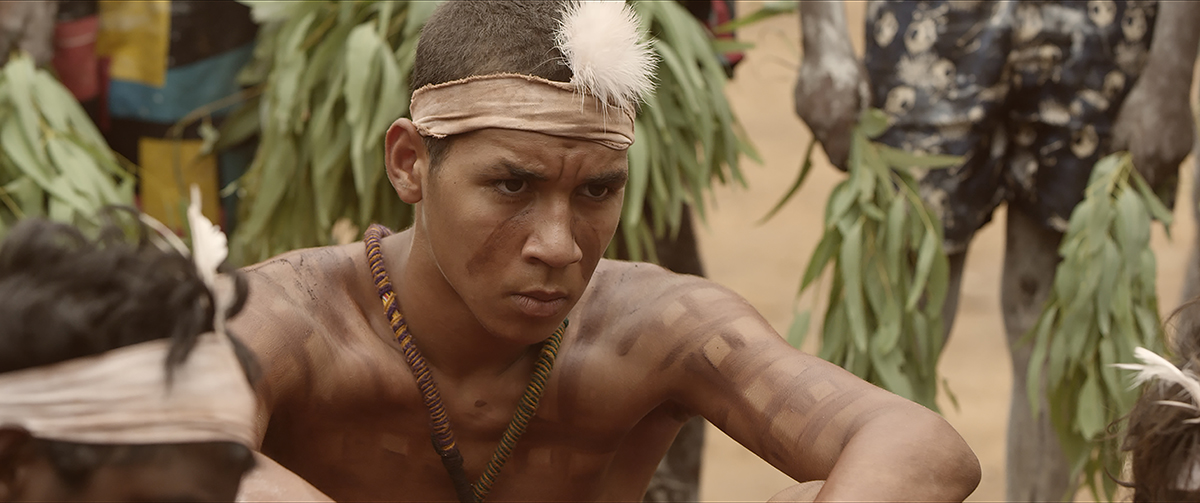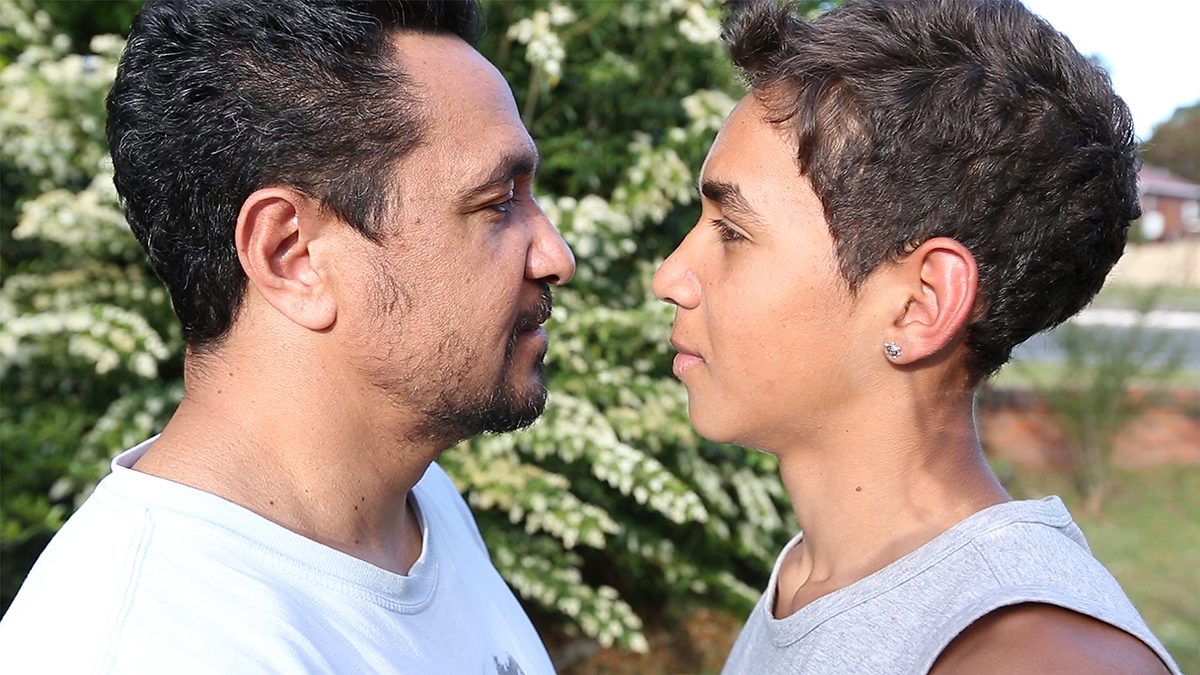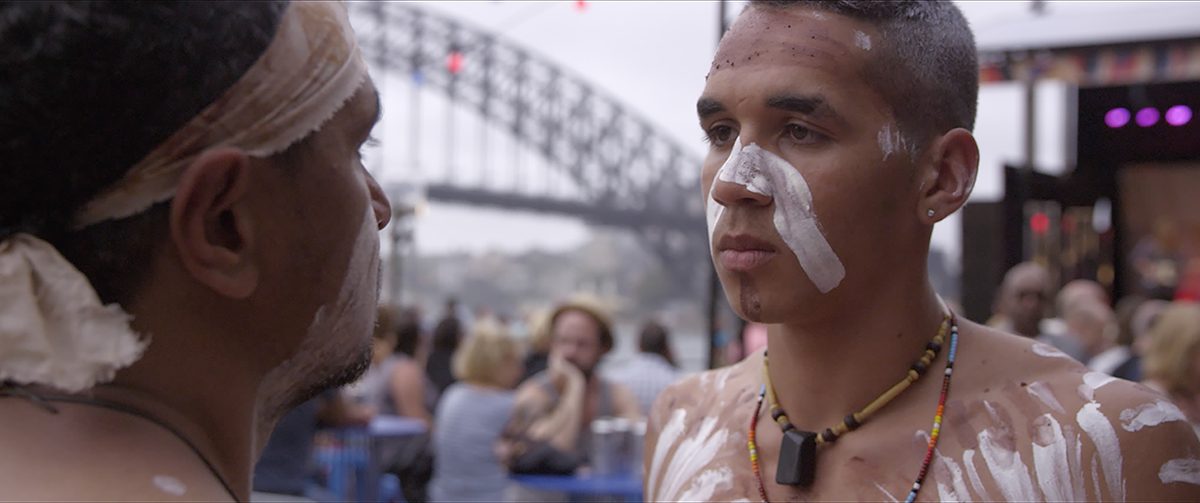
Zach’s Ceremony: complex manhood
Cold time, in these southern trees the sap is running now, so I cut bark for coolamons with my son. I’m working on a shield as I begin to prepare for the season of Law, ceremony and initiation, fast approaching in the next few months. It is a propitious time for me to view Aaron Petersen’s documentary Zach’s Ceremony, which follows the journey of a young Aboriginal boy and his father from 2005 to 2016, when the boy becomes a man and goes through ceremony, comes into Law.
I approach the film with trepidation, glimpsing on the internet excited claims of “never-before-seen footage of secret initiation ceremonies!” I worry that Men’s Business images will be shown to women and children, that our gendered controls of sacred knowledge, designed to protect the agency of both sexes, will be compromised. My fears are allayed as I find that only the pre-ceremony business involving the whole community is exposed. But the film opens another can of worms for me, in its exploration of the destructive intersections between Western masculinity and Aboriginal manhood.
Alec Doomadgee, a Waanyi, Garawa and Gangalidda man from the Gulf country up north, culture man and role model, is attempting to act as a one-man-village raising his son, Zach. Struggling alone in the city to provide the nurturing support traditionally undertaken by multiple aunties, uncles, parents, grandparents and older siblings, Alec is confounded by a conflicting imperative to forge his son into a fine example of the contemporary ‘Indigenous success’ mythology — an enterprising, neoliberal individual who is equally at home in lap-lap or blazer. But this story is not about him — it is about a boy who longs to come into his own knowledge and identity from the unenviable position of being the son of a great man.
His father’s presence looms large both in Zach’s life and onscreen, in a struggle that is sometimes awkward, sometimes poignant. The film is not narrated, although often it feels like Alec is attempting narration in front of the camera, or to curate his family’s story in the public domain. It is difficult for any Aboriginal person, though, to avoid tour-guide registers when coming under the white gaze. That is how we survive in this colonial economy. An animated montage of the history of Indigenous dispossession in Australia would work as a standalone introduction to Indigenous issues for novices, but is an unobtrusive and unifying element of the film.
I wondered in the opening sequences how gender would be framed. I had a moment of worry when the first mention of a woman, Zach’s absent mother, is quite damning and followed instantly by a cut to images of simpering, bikini-clad models signalling the rounds at Alec’s boxing title match. Following his victory, Alec preaches a ‘you can do anything if you work hard enough message’ to young Zach. After this, the difference between this competitive Western masculinity and Aboriginal manhood is made shockingly clear when we see father and son on their traditional lands back up north.
This monumental shift recurs whenever they return to that remote community. Alec’s code-switching to Aboriginal English always signals a reversal from masculine bravado to a humble gentleness grounded in connection to place and people. Zach’s own shrill adolescence flips over into a rumbling, steady repartee with his cousins. Powerful local matriarchs, unrestrained by the straitjacket of Western throw-like-a-girl femininity, fill the screen and the viewer’s heart with their enormous strength and wisdom. The ceremony the filmmakers are privy to involves these glorious old ladies leading a complex process of handing over the boys for their transition into Aboriginal manhood. Talking head shots of clan elders in a variety of locations maintain interest, while some occasional gritty hand-held realism is sensitively included without overuse.
We see the chasm between traditional roles and Western masculinity when Zach emerges transformed from ceremony and returns to his father’s house in Sydney. Having been through ceremony together, there is a loving and playful intimacy that he shares with his little brother, a softness and deep capacity for care that is what true manhood is all about. But Zach reverts during his 16th birthday party to that lawless, unaccountable maleness that Anglo modernity bestows on all young men, and the viewer is at once devastated as well as relieved not to be left with a simplistic, romanticised message of ‘walking in both worlds.’
Zach’s Ceremony is ultimately not as uplifting as the adults speaking for and through Zach try to make it. But there is a truth in Zach’s eyes and words (and even his sneaky Dave Chappelle references) that triumphantly subverts the powerful genres and agendas whirling around his image, making us connect with him intimately and care deeply about his fate.
The DVD of Zach’s Ceremony will be released by Umbrella Entertainment in July.
–
Zach’s Ceremony, director, editor Aaron Peterson, writer, producer Sarah Linton, cinematographer Robert C Morton, music Angela Little, art direction Brendan Cook, associate producer Alec Doomadgee, executive producer Mitzi Goldman, distributor Umbrella, 2016.
Dr Tyson Yunkaporta is a Bama fulla currently working as a senior lecturer at Monash University, with research interests in Aboriginal cognition, methodologies, memory and pedagogy.
Top image credit: Zachariah Doomadgee, Zach’s Ceremony, still courtesy Umbrella Entertainment








